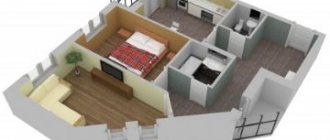Total area of the apartment
The total area of a residential premises consists of the sum of the areas of all parts of such a premises: hallway, bedrooms, living room, kitchen, dressing room, pantry, bath and toilet. The exceptions are balconies, loggias, verandas and terraces.
The general quadrature is used for the purpose of calculating utility bills for heating and determining the base for calculating the tax on living space.
It is necessary to distinguish from the total area of housing the area that includes balconies, loggias, terraces using reduction factors: for loggias - 0.5, for balconies and terraces - 0.3, for verandas and cold storage rooms - 1.0. This indicator is used to calculate fees for housing maintenance and repair (maintenance), and to calculate the amount of subsidies for housing and utilities.
House
The definition of the concept of “residential building” is, first of all, contained in Part 2 of Article 16 of the RF Housing Code:
A residential building is recognized as an individually defined building, which consists of rooms, as well as premises for auxiliary use, intended to satisfy citizens' household and other needs related to their residence in such a building.
There are multi-apartment, individual, and blocked residential buildings
An apartment building is a residential building in which apartments have common non-apartment premises and engineering systems (“Methodological manual for the maintenance and repair of housing stock. MDK 2-04.2004” (approved by the State Construction Committee of Russia).
An individual residential building is a separate residential building with no more than three floors, intended for one family to live in (individual housing construction object) (Decision of the Council of Deputies of the urban settlement Shakhovskaya MO dated 10.29.2013 N 10/62 (as amended on 10.28.2014 ) “On approval of the Rules for land use and development of the urban settlement of Shakhovskaya, Shakhovsky municipal district, Moscow region”).
An individual residential building is a single-apartment residential building intended for living by one family and having a house plot (Decision of the Council of Deputies of the Dzerzhinsky Municipal District of 22.02.2012 N 5/2 (as amended on 28.11.2012) “On the Regulations on the approval of Land Use and Development Rules municipal formation "City district Dzerzhinsky" of the Moscow region).
Blocked residential building : A building consisting of two or more apartments, each of which has direct access to the local area (Order of the Ministry of Emergency Situations of Russia dated April 24, 2013 N 288 (as amended on July 18, 2013) “On approval of the set of rules SP 4.13130 “Fire-fighting systems protection. Limiting the spread of fire at protection facilities. Requirements for space-planning and design solutions" (together with "SP 4.13130.2013. Code of rules. Fire protection systems. Limiting the spread of fire at protection facilities. Requirements for space-planning and design solutions" ).
Blocked residential building - a residential building with no more than three floors, consisting of several blocks, the number of which does not exceed ten and each of which is intended for one family, has a common wall (common walls) without openings with the adjacent block or adjacent blocks, located on a separate land plot and has individual access to a public territory (Decision of the Council of Deputies of the urban settlement Shakhovskaya MO dated October 29, 2013 N 10/62 (as amended on October 28, 2014) “On approval of the Rules for land use and development of the urban settlement Shakhovskaya of the Shakhovsky municipal district Moscow region").
A blocked residential building is an apartment-type building consisting of two or more apartments, each of which has direct access to the apartment area (“Methodological recommendations for protecting the rights of participants in the reconstruction of residential buildings of various forms of ownership” (approved by Order of the State Construction Committee of the Russian Federation dated November 10, 1998 N 8).
Residential buildings are distinguished by type:
A residential building of a gallery type is a building in which apartments (or dorm rooms) have exits through a common gallery to at least two staircases (“Methodological recommendations for protecting the rights of participants in the reconstruction of residential buildings of various forms of ownership” (approved by Order of the State Construction Committee of the Russian Federation dated November 10. 1998 N 8).
Corridor-type residential building : A building in which all apartments on the floor have exits through a common corridor into at least two staircases (“SP 4.13130.2013. Code of rules. Fire protection systems. Limiting the spread of fire at protection facilities. Requirements for space-planning and constructive solutions” (approved by Order of the Ministry of Emergency Situations of Russia dated April 24, 2013 N 288).
A residential building of a corridor type is a building in which apartments (or dorm rooms) have exits to staircases through a common corridor (“Methodological recommendations for protecting the rights of participants in the reconstruction of residential buildings of various forms of ownership” (approved by Order of the State Construction Committee of the Russian Federation dated November 10, 1998 N 8) .
Residential building of sectional type : A building consisting of one or several sections, separated from each other in the residential part by building structures without openings and having independent evacuation exits (“SP 4.13130.2013. Code of rules. Fire protection systems. Limiting the spread of fire at protection facilities Requirements for space-planning and design solutions" (approved by Order of the Ministry of Emergency Situations of Russia dated April 24, 2013 N 288).
A residential building of a sectional type is a building consisting of one or several sections (“Methodological recommendations for protecting the rights of participants in the reconstruction of residential buildings of various forms of ownership” (approved by Order of the State Construction Committee of the Russian Federation dated November 10, 1998 N 8).
This is important to know: Responsible tenant in a municipal apartment
Living area of the apartment
Living space is the area of rooms intended, according to the project, for permanent residence, that is, living rooms and bedrooms. An increase in living space is possible due to auxiliary premises (corridor, storage room, loggia, etc.) during redevelopment.
The hall, living room and bedrooms belong to the residential part of the apartment
The size of the living space is necessary, for example, to calculate the living space standard in accordance with sanitary and hygienic standards and to carry out the procedure for assessing the living space in order to formalize a purchase and sale transaction.
Article 42 of the RF Housing Code
2. A share in the right of common ownership of common property in a communal apartment is an integral part of the room and always follows the fate of the ownership of it. When the owner of a room changes, the share of the new owner in the right of common ownership is equal to the share of the previous owner.
This is important to know: How to divide personal accounts in a municipal apartment in 2020
4. When transferring ownership of a room in a communal apartment, the share in the right of common ownership of the common property in this apartment of the new owner of such a room is equal to the share in the right of common ownership of the specified common property of the previous owner of such a room.
Legislative norms regulating real estate transactions
In 2020, issues regarding residential premises in apartment buildings are regulated by the Housing Code of the Russian Federation. The code states that the actual area of an apartment includes the sum of all individual parts of the premises, including bathrooms, but excluding external objects.
In addition to the Housing Code of the Russian Federation, there are also Building Codes and Regulations dated 2003 and the Federal Law “Technical Regulations on the Safety of Buildings and Structures” No. 384-FZ dated December 30, 2009. The latter in some aspects prevails over the Housing Code of the Russian Federation and SNiPs.
Please note that according to SNiPs, the total area of the apartment includes all premises and external parts, unheated storage rooms, built-in wardrobes, and mezzanines.
At the same time, in most everyday cases, citizens still need to focus on the provisions of the Housing Code. Such situations include:
— correct calculation of utility bills;
— property tax calculation;
— establishing the cost of housing according to the DDU;
- receiving benefits, compensation, as well as the allocation of a municipal apartment.
Yekaterinburg predicted a boom for a new type of apartments
Interview with the director of TEN Development Yuri Romanovich
Ekaterinburg was predicted to see the emergence of a new housing format. This is the real estate market’s reaction to the crisis and coronavirus. URA.RU discussed with the director of TEN Development Yuri Romanovich which apartments will be in demand in the new realities and what to expect from the housing market in the next six months.
— Does self-isolation prevent developers from selling apartments?
— I monitor analytics on a daily basis. Before March, the sales office received an average of about 600 calls per day; in recent weeks, this figure has remained at the level of 700-750 calls. But we will see how they are converted into deals only in May-June. Personally, I’m preparing for the summer drawdown: people coming out of quarantine are unlikely to be puzzled by buying an apartment. But, on the other hand, during isolation, those who were planning a purchase will have time to think about it. The buyer will now monitor how developers cope with project financing, how actively they build during self-isolation and how they communicate with the buyer. I don’t expect a major setback; demand will most likely be postponed until the fall.
Article on the topic
What to do with apartments during a crisis? Practical advice
— Will the economic crisis affect the volume of investment in real estate, and is it worth investing in it now? Are there any risks?
— Now is the sales season, you can participate, but again you need to look at the developer. I would recommend buying housing that has been under construction for half of its life cycle. If you see that the house is mostly built, then you can invest. According to my forecasts, anti-crisis offers with small apartment areas will now be in demand. This will affect those whose incomes have decreased and who, in the new conditions, are not ready for high mortgage payments.
— Recently, studio apartments with an area of up to 30 square meters have been gaining popularity in Yekaterinburg. Do I understand correctly that in times of crisis there is a high probability that such housing will become the most popular option?
— People understand that now it is better to purchase a type of housing that will not burden them in terms of monthly payments and which the bank is guaranteed not to take away. But I note that the economy segment will be in demand not only against the background of the crisis. The history of classic clients of the 90s taking over huge areas is fading away. People are reoriented, and the developer’s task is to adapt to their requests. We see how huge apartments go on display for a long time and are not sold for a long time.
Young people prefer to take small, compact housing; they spend a lot of time outside the home, so the apartment is perceived solely as a place where they can spend the night and leave their things.
This year TEN Development is preparing to release an anti-crisis housing package with studio apartments up to 20 square meters. We are talking about two houses in the Svetly microdistrict. The average bill will be 1.3-1.5 million rubles. With a mortgage with a down payment of 10%, this is about 150 thousand rubles of your own investment.
This story will work for students, families with maternity capital, immigrants and investors. In the latter case, the income from the studio will be comparable to the income from a one-room apartment of 40 square meters, but the entrance fee will be two times lower.
Another category of potential buyers are people who find themselves in a difficult situation, when in more comfortable times they bought an apartment with a mortgage, but now they cannot cope with the payments. In this case, they will withdraw from past deals and enter into more understandable ones that will not burden them.
— What will happen to comfort and business class housing? Will the priorities of buyers and developers change in this case? Perhaps we will have to develop the outskirts of the city for the construction of this level of housing in order to make the price tag more affordable in a crisis?
— The supply of comfort and business class apartments in the city center should be limited. And this is dictated not by the coronavirus epidemic or crisis, but by the evolution of the real estate market. We have a dense city center and expensive land. There is no point in building anthill houses there, if only because there will not be enough parking space, and this problem will backfire on both the city and buyers. Housing with 300-600 apartments is not business class, don’t kid yourself. Business-class housing projects in the center will remain, but the approach will change. We are currently launching one such project for 78 apartments for the entire complex.
Yuri Romanovich recommends buying apartments during a crisis only from trusted developers
Photo courtesy of TEN Development
— Will this type of housing format, such as apartments, finally have a chance to conquer the Yekaterinburg market or will the crisis, on the contrary, worsen the sales situation?
— Developers are already joking about this topic: “They can’t lock you up at your place of registration, because the apartments don’t have one.” My personal opinion, again, is that the history of apartments in Yekaterinburg is a dead topic. We dealt with a number of apartments, including the completion of the Octave. This is not a format for our city.
- Why?
- Apartments do not have advantages - high cadastral value, high tax rate, impossibility of registration. They are built where residential premises cannot be built according to the standards, which means there is a difficulty in providing schools and kindergartens. Therefore, in Yekaterinburg, the topic of apartments must be closed once and for all. There is only one unfinished project left at Meteogorka, the work is going smoothly and there are many difficulties. Reasonable developers don't take on apartments.
— Should we be afraid that long-term construction will appear on the real estate market again and how to avoid this?
— I don’t foresee any critical stoppages in construction; non-systemic developers who decided to build one-time houses will be eliminated. They already began to leave the market at the stage of introducing escrow accounts [they now hold the money of buyers of apartments in buildings under construction until the final delivery of the house by the developer - editor's note].
The only advice to the consumer is to work with companies that have been on the market for a long time, are well-known, understandable and continue to build and deliver houses. There is a “Unified Resource for Developers” in the Sverdlovsk Region, the buyer can move through the top ten.
As part of project financing, if the developer behaves adequately, banks will not suspend the transfer of funds, especially since, as far as I know, additional government subsidies are planned for the rates on these loans. The crisis has not yet affected the construction process itself. There is a governor's order requiring continuous cycle companies to operate. Our construction sites are fully operational. There are a number of problems with the arrival of seasonal workers who did not have time to arrive before the borders were closed, and with some industries that stopped working due to self-isolation, but the construction process was not disrupted. We do not plan to slow down the pace of construction.
— I can’t help but ask about another segment of the market - commercial real estate. How much will it sag due to the problems that business is already facing and should we expect a reduction in rental rates?
— The losses incurred by merchants and tenants of commercial real estate are colossal in any case. There will be some support measures, but who will survive this situation is still a big question. Depends on how long we stay in quarantine. In general, I don't believe in commercial real estate. This is a position that I formed quite a long time ago. And this is not a question of crisis, this is again an evolutionary leap. What was postponed for years to come has now become a reality - we are seeing remote sales, the volumes of which have increased significantly.
Related news
In Yekaterinburg, the program with a mortgage from 1.9%, which is popular among Ural families, has been extended
The addictive effect is developed in 21 days. People, having spent 21 days in self-isolation making deliveries, will get used to the fact that everything can be bought remotely. And this topic will develop. Therefore, I do not see good prospects for commercial real estate. Most likely, retail will slowly die out. The same States went through this; shopping centers will move into the entertainment sector - cinemas, children's and sports areas.
— Does your company feel losses due to the coronavirus and the crisis? How are they expressed and how will they be compensated?
— We see a jump in exchange rates by at least 20%, plus the shutdown of factories in China and the suspension of a number of European productions, the closure of borders. All this will affect the equipment that is purchased for our homes, and the cost will certainly increase for us. As of today, the main suppliers and contractors have confirmed the prices for which we are contracted, but in the future they predict an increase in their goods and services. No one can say how much it will be yet.
— If the price tag increases for you, will you, accordingly, increase it at the exit for the consumer and by how much?
— An anecdote in which a grandmother sold a sparrow for 100 rubles: “What’s so expensive?” “So you need money, my dear” - this doesn’t work in the real estate market. There is a certain figure that a buyer is willing to pay for an apartment, and no matter what costs the developer incurs, a person will not pay more than the average price established in the market. Roughly speaking, if the market average price remains at 80 thousand rubles per square meter, then they will no longer buy an apartment for 100 thousand per square meter. All costs are, in any case, a minus to the developer’s margin.
You definitely shouldn't expect a price increase. Incomes will not increase in the near future. The developer who sharply increases prices will lose clients.
This is the short term for this year. If we talk about the long term, in general, a lot of houses are being built in Yekaterinburg, while developers do not launch many projects, they are slowing down, they are waiting out. As a result, we may face the fact that if supply in the primary market decreases, demand will remain the same. It is possible that one of the developers will raise the margin on this and try to raise the price.
— Are there any benefits and subsidies provided for the developer during the crisis?
-The decisions that are now being made to control the situation and provide assistance to systemically important industries from the state are unprecedented. I haven't seen anything like this in 40 years. There is a story with mortgage holidays, however, with restrictions on amounts - no more than one and a half million, there is support from the construction industry - for deferring the transfer of apartments under an equity participation agreement in the period from April 3, 2020 to January 1, 2021, developers will not pay a penalty to the shareholder. This is probably correct, because it is still possible for developers to have some problems with delivery deadlines.
— To what extent has the coronavirus complicated real estate transactions and coordination of projects at different levels?
“Our employees took tests for coronavirus, everyone’s results were negative, and no one went into self-isolation. Construction hasn't stopped. The sales department works remotely via online, provides consultations, prepares documents, and communicates with banks. From the point of view of document approval, things definitely haven’t gotten any worse. There are a number of difficulties associated with the fact that now we have to do all this remotely, but in principle both the city administration and the Ministry of Construction are working, although reception is limited. We put one residential complex into operation literally on March 30th. So we continue to work as normal and don’t give in to panic.







